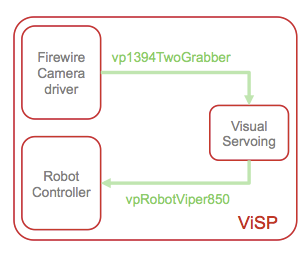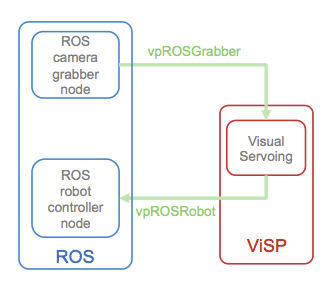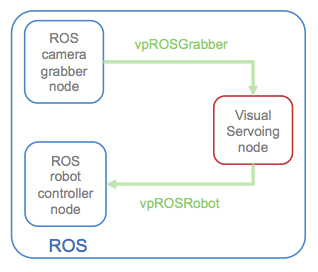Show EOL distros:
Package Summary
An extension of ViSP library that interfaces ROS into usual ViSP classes and a basket of generic ros nodes based on ViSP.
- Maintainer: Fabien Spindler <Fabien.Spindler AT inria DOT fr>
- Author: Francois Pasteau, Fabien Spindler
- License: GPLv2
- Source: git https://github.com/lagadic/visp_ros.git (branch: master)
Package Summary
An extension of ViSP library that interfaces ROS into usual ViSP classes and a basket of generic ros nodes based on ViSP.
- Maintainer: Fabien Spindler <Fabien.Spindler AT inria DOT fr>
- Author: Francois Pasteau, Fabien Spindler
- License: GPLv2
- Source: git https://github.com/lagadic/visp_ros.git (branch: master)
Package Summary
An extension of ViSP library that interfaces ROS into usual ViSP classes and a basket of generic ros nodes based on ViSP.
- Maintainer: Fabien Spindler <Fabien.Spindler AT inria DOT fr>
- Author: Francois Pasteau, Fabien Spindler
- License: GPLv2
- Source: git https://github.com/lagadic/visp_ros.git (branch: master)
Package Summary
An extension of ViSP library that interfaces ROS into usual ViSP classes and a basket of generic ros nodes based on ViSP.
- Maintainer: Fabien Spindler <Fabien.Spindler AT inria DOT fr>
- Author: Francois Pasteau, Fabien Spindler, Gatien Gaumerais
- License: GPLv2
- Source: git https://github.com/lagadic/visp_ros.git (branch: master)
Package Summary
An extension of ViSP library that interfaces ROS into usual ViSP classes and a basket of generic ros nodes based on ViSP.
- Maintainer: Fabien Spindler <Fabien.Spindler AT inria DOT fr>
- Author: Francois Pasteau, Fabien Spindler, Gatien Gaumerais, Alexander Oliva
- License: GPLv2
- Source: git https://github.com/lagadic/visp_ros.git (branch: master)
Package Summary
An extension of ViSP library that interfaces ROS into usual ViSP classes and a basket of generic ros nodes based on ViSP.
- Maintainer: Fabien Spindler <Fabien.Spindler AT inria DOT fr>
- Author: Francois Pasteau, Fabien Spindler, Gatien Gaumerais, Alexander Oliva
- License: GPLv2
- Source: git https://github.com/lagadic/visp_ros.git (branch: master)
Contents
What is visp_ros
visp_ros is an extension of ViSP library developed by Inria Rainbow team. While ViSP is independent to ROS, in visp_ros we benefit from ROS features.

visp_ros contains a library:
with new C++ classes (vpROSGrabber, vpROSRobot, vpROSRobotPioneer, vpROSRobotFrankaCoppeliasim) that could be used like usual ViSP classes. They are based on ROS, but to use them there is no need to know so much about ROS;
- that makes possible to use ROS in a transparent way, either by building classical binaries without catkin, either by building ROS nodes with catkin but without the need to write ROS specific code;
- where creating a ROS node out of ViSP becomes simple.
visp_ros contains also a set of ROS nodes that allow to control specific hardware such as for the moment:
robots that can be controlled only in our lab due to proprietary drivers: Afma6 gantry robot, Biclops PT head, ADEPT Viper 650 and 850 robots described here;
- other robots that anyone can buy and use with open-source drivers interfaced in ViSP: Pioneer mobile robot, Parrot bebop2 drone
visp_ros contains also a tutorial that shows how to simulate a Franka Panda robot using CoppeliaSim.
To illustrate visp_ros behavior let us focus on a visual servoing example.
Visual servoing example
In this example we consider the visual servo of a robot equipped with a firewire camera.
Using ViSP
With ViSP, images from a firewire camera connected to a computer running Ubuntu or Fedora can be acquired using vp1394TwoGrabber class. There are also some specific classes like vpRobotAfma6, vpRobotViper850, vpRobotPioneer that are wrapper over robot controllers.
Implementing a visual servo with ViSP is resumed in the next image:

The corresponding code looks like the following:
#include <visp/vpImage.h>
#include <visp/vp1394TwoGrabber.h>
#include <visp/vpRobotViper850.h>
int main()
{
vpImage<unsigned char> I;
vpRobotViper850 robot;
robot.init();
vp1394TwoGrabber g;
g.open(I);
while(1) {
g.acquire(I);
// Visual servoing code
robot.setVelocity(vpRobot::CAMERA_FRAME, v);
}
}
Using visp_ros
Using visp_ros allows to completely separate the code that is specific to the material (frame grabber, robot) from the one that does the visual servoing.
In visp_ros we introduce a new class named vpROSGrabber that is able to subscribe to an image topic. This class can be used to replace any ViSP grabber. We also introduce vpROSRobot that is able to publish cmd_vel velocities on a given topic.

Now using visp_ros, we can do the same by subscribing to the /camera/image_raw topic and by publishing velocities to the /myrobot/cmd_vel topic.
#include <visp/vpImage.h>
#include <visp_ros/vpROSGrabber.h>
#include <visp_ros/vpROSRobot.h>
int main()
{
vpImage<unsigned char> I;
vpROSRobot robot;
robot.setCmdVelTopic("/myrobot/cmd_vel");
robot.init();
vpROSGrabber g;
g.setImageTopic("/camera/image_raw");
g.open(I);
while(1) {
g.acquire(I);
// Visual servoing code
robot.setVelocity(vpRobot::CAMERA_FRAME, v);
}
}It is also possible to subscribe to a jpeg topic named for example "/camera/image_jpg" using the following code:
...
vpROSGrabber g;
g.setImageTopic("/camera/image_jpg"); // Name of the compressed topic
g.setImageTransport("jpeg"); // Type of compression. Must differ from "raw"
g.open(I);
...This tutorial highlights vpROSGrabber usage.
Using visp_ros to produce a ROS node
With minor changes, it is possible to modify the previous example in order to create a ROS node that does the visual servoing in a complete transparent way just by passing argc and argv parameters.

#include <visp/vpImage.h>
#include <visp_ros/vpROSGrabber.h>
#include <visp_ros/vpROSRobot.h>
int main(int argc, char **argv)
{
vpImage<unsigned char> I;
vpROSRobot robot;
robot.setCmdVelTopic("/myrobot/cmd_vel");
robot.init(argc, argv);
vpROSGrabber g;
g.setImageTopic("/camera/image_raw");
g.open(argc, argv);
while(1) {
g.acquire(I);
// Visual servoing code
robot.setVelocity(vpRobot::CAMERA_FRAME, v);
}
}
Controlling a Parrot Bebop2 drone by Visual-Servoing
Using visp_ros allows to do visual servoing with the Parrot Bebop 2 drone. The following video shows an example.
This tutorial explains how to proceed.
FrankaSim: Simulating Franka robot using CoppeliaSim
Using visp_ros makes possible to simulate a Franka robot in position, velocity and force control. All the rendering and sensing is done through CoppeliaSim while the geometric and dynamic model is handled in visp_ros. Communication between visp_ros and CoppeliaSim is done using ROS.
The simulation is a physical simulation with a model that has been accurately identified from a real Franka robot. All the details are in the paper:
C. Gaz, M. Cognetti, A. Oliva, P. Robuffo Giordano, A. De Luca, Dynamic Identification of the Franka Emika Panda Robot With Retrieval of Feasible Parameters Using Penalty-Based Optimization. IEEE RA-L, 2019.
If you are using this simulator we would appreciate that you cite this paper.
The following video shows an example of Image-Based Visual-Servoing performed with a simulated Franka robot.
There is a tutorial that explains how to start with this simulator to implement an image-based or position-based visual-servoing, or also an impedance controller, but right now this tutorial doesn't appear in visp_ros C++ API documentation. To generate this tutorial from source code we suggest to instructions described in Build documentation and tutorials section using rosdoc_lite to generate the package Doxygen documentation.
Installation
The tutorial How to install visp_ros explains how to build and install visp_ros in a catkin workspace.
You may also find installation instructions here.







